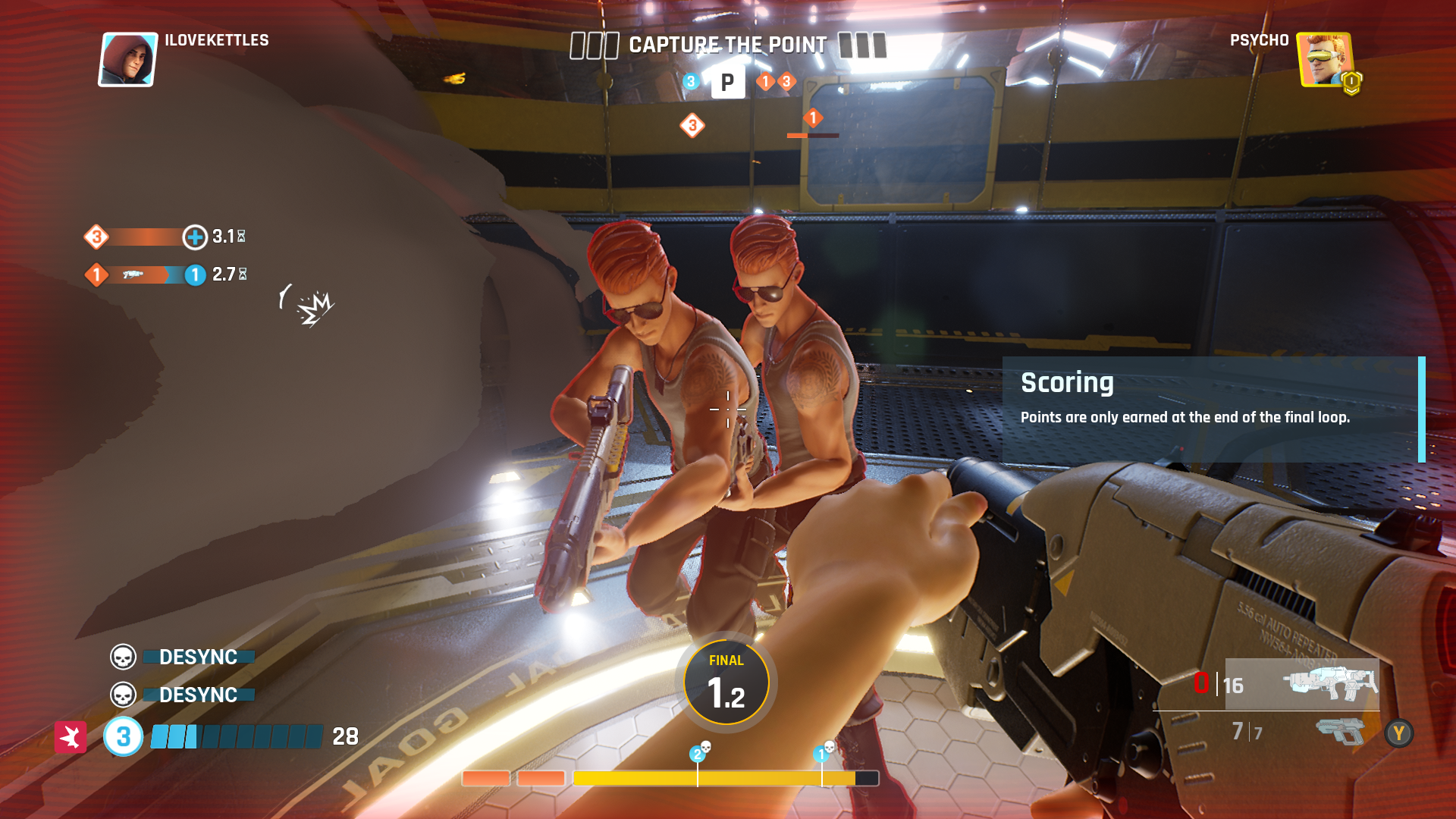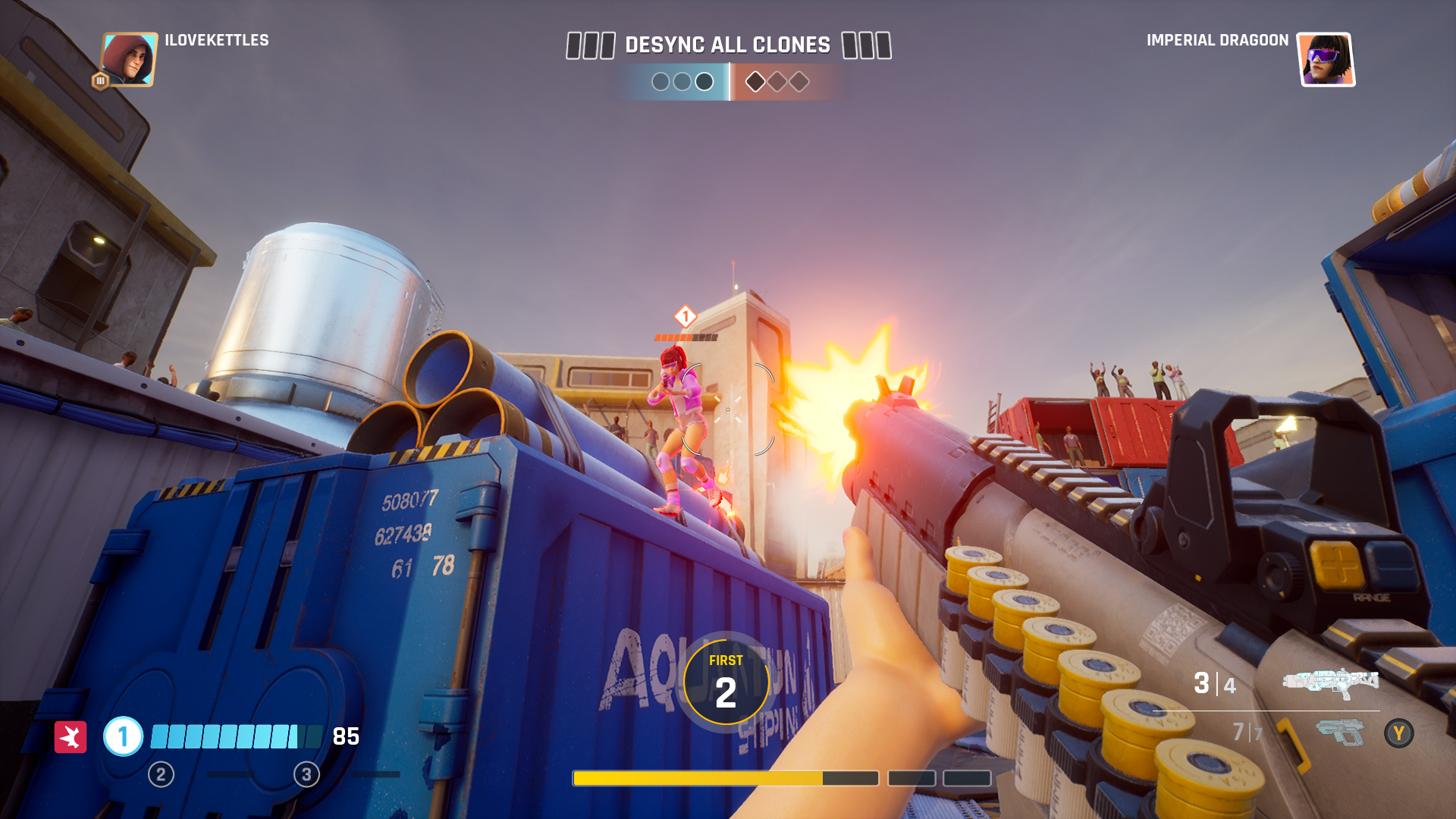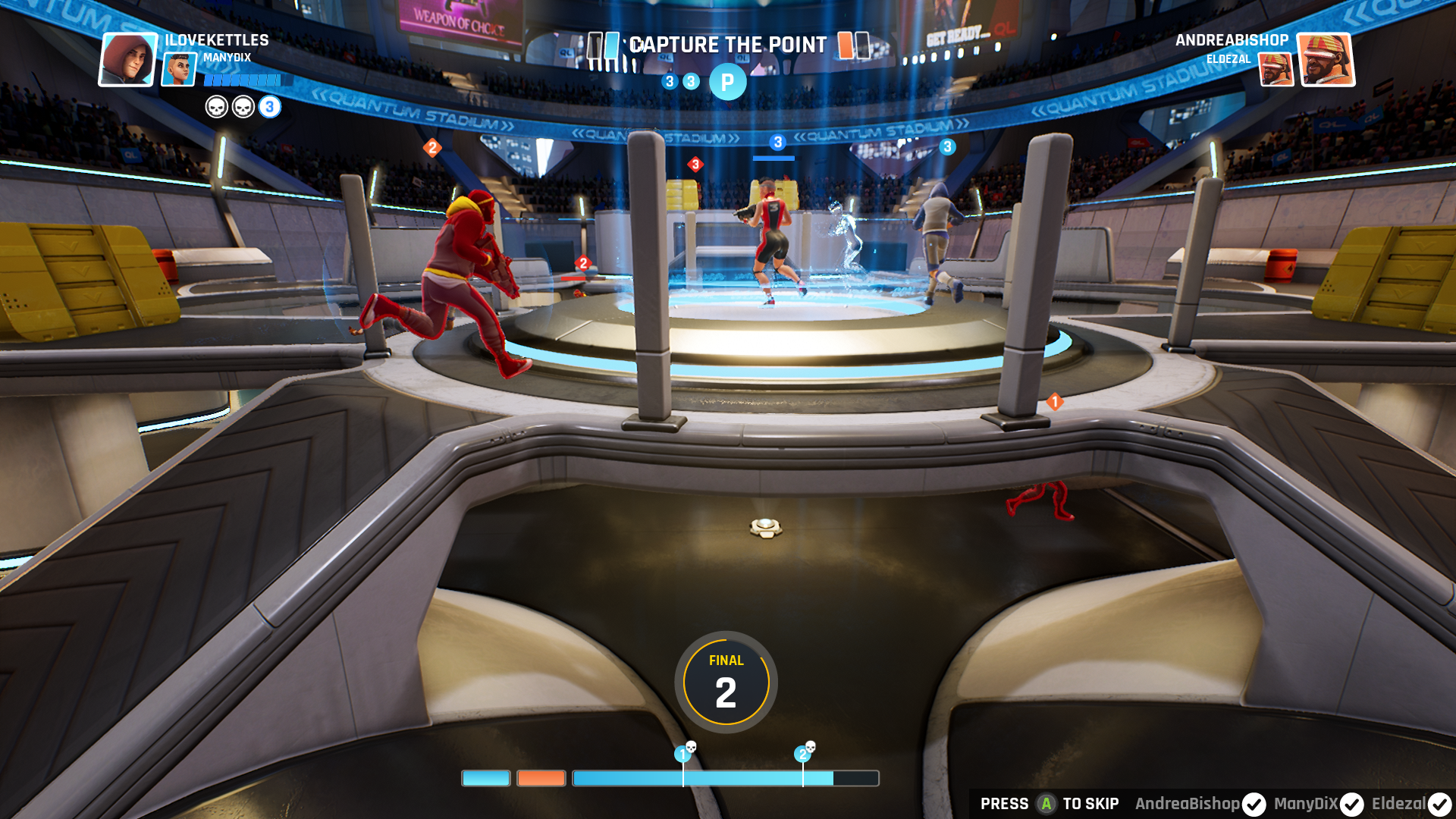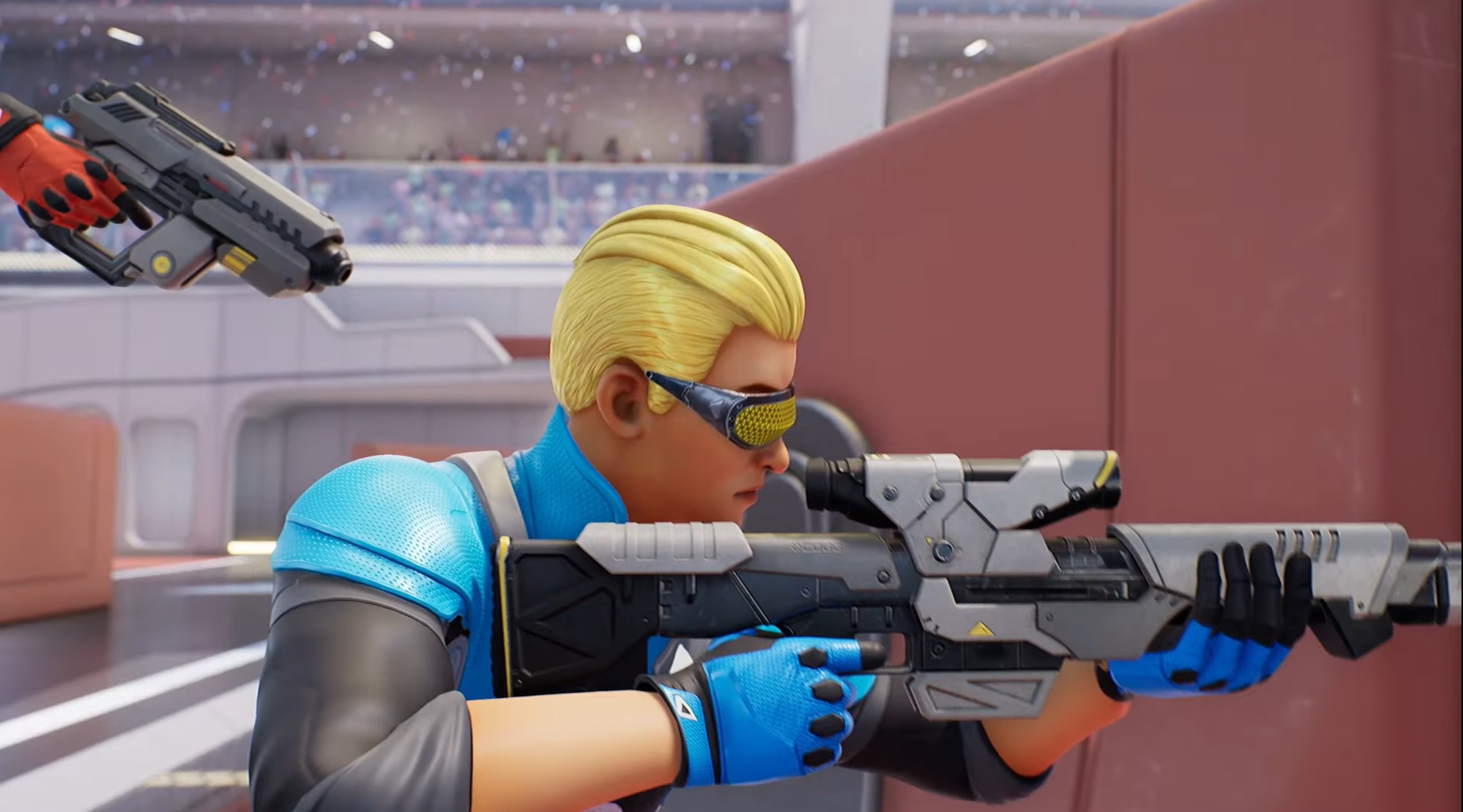Our Verdict
All three of me agree, there's nothing quite like it. Quantum League is worth your time.
PC Gamer's got your back
What is it? A competitive FPS where you play alongside your past selves.
Expect to pay £7/$10
Developer Nimble Giant Entertainment
Publisher Nimble Giant Entertainment
Reviewed on GeForce GTX 1650, AMD Ryzen 5 3550H, 8 GB RAM
Multiplayer 2-4
Link Official site
Having spent several days agonising over how best to explain Quantum League's complex premise, I’ve decided that the best course of action is to (partly) lie. So, I'm going to tell you that this is a competitive 1v1 or 2v2 FPS consisting of three-round matches. At the end of the first round, you travel back in time to fight alongside yourself for the second round; then time rewinds once more, so that you're fighting alongside two previous versions of yourself.
With me so far? OK, let me give you an example. I'm playing a 1v1 point capture match. In the last seconds, my opponent and I are both on the point, but they kill me just as time runs out. Time rewinds, the second round begins, and I run ahead of the previous version of myself. My plan is to take out my opponent from the first round before they can kill the version of me a few steps behind. Despite efforts from the second round version of my opponent, I succeed. Time rewinds one final time, and I watch the two previous versions of me run ahead as I cover them with a sniper rifle. Only one of my past selves survives, but they're on the point alone, so I score.
If like me you’ve got a bit of a headache now, let me assure you that it’s much, much easier to understand than it is to explain. Traditional FPS skills remain essential—you need good aim and fast reactions, headshots do more damage, and use of cover is often key to survival—but Quantum League, really, sits in a genre all of its own. It’s essential to understand this if you want to succeed.

Your past selves are utterly oblivious to your presence, of course—they're essentially recordings—and this is what makes this the only game I've ever played where the inclusion of friendly fire makes perfect sense. Stumble in front of one of your clones at the wrong moment, and you could take yourself out with a headshot. Similarly, you might damage or kill one of your clones in the heat of the moment and completely ruin your chances. In 2v2 matches, with two 'live' players and four clones per team in the final loop, this can lead to mistakes that are frustrating and hilarious in equal measure.
Time to die
If this is already giving you a headache, there's more to come. Matches aren't quite as brisk as I described, and Crucially, when you're killed, you carry on playing for the remaining time as a ghost. Although you can grab a health orb to resurrect yourself, it's often better to act as though you never died. If you can save yourself in a subsequent round, then all of your actions as a ghost—hits landed, points occupied—will now count. It's yet another layer of clever, mind-bending strategy that you'll need to git gud at.
In addition to the (sometimes questionably placed) health orbs, maps include jump pads and sniping points to add an element of verticality. There are explosive barrels, too; something that you may roll your eyes at, but that can factor into tactical play in ways you'll find yourself grateful for. And there's the added bonus of getting to watch your opponent's corpse comically cartwheel through the air when you blow one up.

Given the innovation and wonderful attention to detail visible throughout the game, it's incredibly frustrating to see some fundamentals fumbled. The default stick sensitivities for a controller are absolutely terrible, putting the onus on the player to calibrate them properly (something I was never able to do to my complete satisfaction). The maps, of which there are currently eight, are a little disappointing. Most are somewhat homogenous visually, with exceptions like Museum, which is the best by far in terms of assets, character, and topography.
While there are only six weapons to choose from, this makes perfect sense in context. Each 'loop' typically lasts for only 15 seconds, and the guns vary enough to allow you to adapt to the current state of the match. Want to defend clones from a distance? Rifle it is. Expecting close encounters? Grab a shotgun. Want to deny the enemy team a point while they're clustered together on the point? Grenade launcher. And so on.
Central Quark
While there are only six weapons to choose from, this makes perfect sense in context. Each 'loop' typically lasts for only 15 seconds, and the guns vary enough to allow you to adapt to the current state of the match. Want to defend clones from a distance? Rifle it is. Expecting close encounters? Grab a shotgun. Want to deny the enemy team a point while they're clustered together on the point? Grenade launcher. And so on.

In a nod to hero shooters, one addition made during the early access period was unique abilities for each one of the six characters. The effectiveness of most is debatable, and the ability which allows you to swap your always-equipped pistol for another primary—which requires you to make a selection in the middle of a match—is arguably a disadvantage.
Despite some undeniable rough edges, Quantum League does a lot of things right. Perhaps the most exciting thing about it is that, unless you're doing amazingly well or amazingly badly, it's impossible to predict a winner until the end of that third loop. Ambushers can be ambushed, resurrections prevented (grab the health orb before your opponent's clone), and victory snatched from the jaws of defeat with milliseconds to spare. Not many shooters can make you feel clever in the way that this one can.
The playerbase at time of writing is small but enthusiastic and, thanks to the fact that no match needs more than four players to begin, the numbers are no barrier to play (I rarely had to wait more than 30 seconds to find a match). There are some bizarre design decisions—ranked 2v2 can only be initiated with a friend, and not every mode (point capture, domination, deathmatch) is available on every map—but overall, Quantum League differentiates itself from other shooters (mostly) in the right ways.
All three of me agree, there's nothing quite like it. Quantum League is worth your time.


